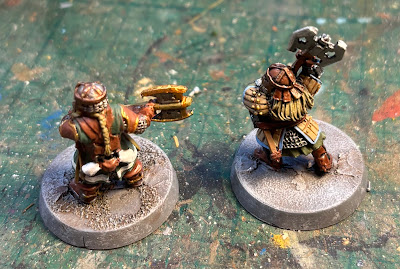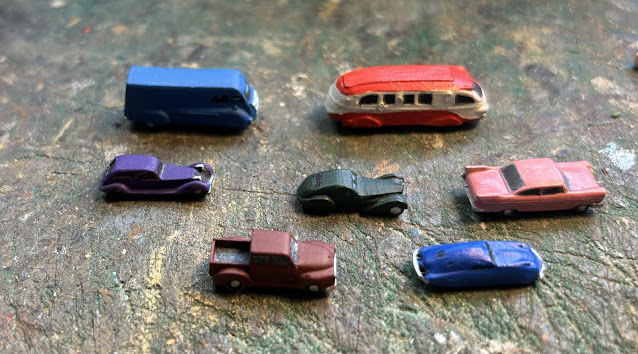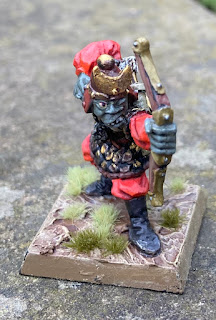I've been having a go at a couple of small games of TacWW2 with some adaptations to the Cold War era. Here's what's just happened.
Sometime in the mid-1970s a Soviet tank battalion (Tac 7, Normal Morale, in T-62s, supported by a Motor Rifle Company in BMP-1s) is attacking an area held by a small British battlegroup (Tac 5, Normal Morale) with a squadron of Chieftains supported by a company of infantry and a couple of reconnaissance troops in Scimitars. The positions after the Movement Phase are as follows:
 |
| The table, after the Move Phase |
I began by making Tac rolls for the two Scimitars to communicate with their HQ (on the assumption that they would have located the enemy units previously). One of the two Tac rolls was successful so the British Tac score improves from 5 to 4 this turn (this is one of my version 1.5 additions to the rules).
In the Spotting Phase all of the British rolled 4 or better to pass their Spotting Tac tests. Of the Soviet units, only the BMP company managed to pass. This would make no difference, though, as none of the Soviet companies was close enough to spot the infantry and the Scimitars would bug out before they could be fired at.
In Fire Phase A the Chieftains (in Defence Mode) fired at the left T-62 company. They needed a base 5+ (up to 128mm gun in the 80cm range bracket) to which I applied modifiers of +1 (superior fire control - a new addition) and -4 (assumed T-62 armour) meaning they needed to roll 8+. They scored 3,5 and 7 - all misses!
The Milan team elected to hold their fire (for reasons that will become apparent).
In Fire Phase B the left T-62 company returned fire. They needed a base 5+ modified by -1 (cover) and -5 (Chieftains' armour). In this case (target number = 11) they score Neutralisations on a 10. They rolled 10, 10, 7! Two Chieftains were Neutralised, the Soviet commander having declined the option of a Tac roll to specifically target the HQ Chieftain (another recent rules addition).
In Fire Phase C, the remaining Chieftains (two including the battlegroup HQ troop) could fire again. Scores of 4 and 9 led to one T-62 of the left company being Neutralised.
Also in Fire Phase C, the Milan platoon fired at the centre T-62 company. The T-62s got to try a Tac roll to see if they could respond to the incoming missiles but failed so the combat was resolved unmodified. I'd decided that at this range the Milan needs 4+ to hit and that the T-62s' armour would be ignored. If they had been T-80s with modern composite armour I'd count their armour modifier at half effect. The Milans rolled a 4 so a T-62 platoon was Neutralised.
In Fire Phase D one of the BMP platoons could now see the Milan platoon but at extreme range for the 73mm low pressure gun it failed to get the 10 it needed to cause suppression.
Company Morale Tests were now required for the Chieftains (passed rolling a 10 despite having two out of three troops Neutralised), the centre T-62 company (passed with a 7) and the left T-62 company (a Halt result on a roll of 4).
With the British still effectively on Tac 4, one of the Chieftains immediately rolled successfully to become unneutralised but the rest of the Neutralised elements would remain so for the next turn.
For those interested my current working ATGW rules are as follows:
Each ATGW has a minimum and maximum range (for the Milan this is 1cm to 50cm, for Sagger it's 12cm to 75cm). Each is rated 10(vs soft)/7(vs hard) at its minimum range band and 10/4 at all other ranges. Armour is ignored unless modern composite armour which has half its usual modifier.
ATGWs can only be fired once per turn and only by units in Defence or Prepared Defence. They may fire in phases A or C at the owner's option.
When the firing player declares ATGW fire and nominates a target element, the owner of the element may make a Tac roll for the target's company. Only one such roll is made per company per Fire Phase. The effect of this Tac roll is as follows:
Failed Tac roll - resolve the fire as normal.
Tac roll succeeds by 0 or 1 - target element(s) may evade, company immediately enters Default Mode.
Tac roll succeeds by 2 or more - elements of the target company may make one or more of the following responses:
- pop smoke
- evade
- return fire.
Evade - ATGW fire is resolved with a -2 modifier, the target element may move up to one increment and if this takes it into cover the usual -1 cover modifier applies in addition. If the move takes the target element out of line of sight, the ATGW automatically misses.
Pop smoke - place as more marker on the element, the ATGW shot is resolved at -3. Any subsequent fire (in either direction) this turn is blocked by the smoke.
Return fire - any elements of the target company may, if they have an unused opportunity to fire this turn, fire at the ATGW-firing element. If the firing element is Neutralised or knocked out, the ATGW misses.
Examples:
In Fire Phase A an Egyptian Sagger platoon fires at the centre troop of an Israeli tank company that's in Deliberate Attack mode. The Israeli company (Tac 6) roll a 7. They get the -2 for evading but as there's no nearby cover the Israeli player elects no not actually move the model representing the target troop. The tank company immediately goes into Default mode.
In Fire Phase C another Israeli tank company is also targeted by a Saggers in identical circumstances but this time the player rolls an 8 (passing by two). The targeted tank elects to pop smoke and is now targeted at -3 to the die roll, while the other two tank troops shoot at the Sagger team (as they have an unused fire opportunity this turn in Fire Phase D).
That'll do for now, I'll report back later on progress.











































